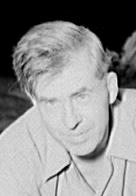God & Country Home
Search Page
HENRY AGARD WALLACE

[Library of Congress]
1888-1965
33rd Vice President (1941-1945)
Education: Iowa State
Occupation: scientist, agronomist, businessman, publisher, writer
Political Affiliation: Republican, Democrat
Organizational Affiliation(s): Mason
Religious Affiliation: Episcopalian
Summary of Religious Views:
Wallace was something of a religious seeker throughout his life. In his youth, he was deeply influenced -- both in his religious and his scientific views -- by George Washington Carver, with whom he spent a good bit of time. Wallace was raised as a Presbyterian, but left that faith early in his life. He subsequently explored a number of religions, including Catholicism, Judaism, Buddhism, Islam, Zoroastrianism, and Christian Science. Eventually, he settled on Episcopalianism, but even while professing that faith, he became involved with the Russian mystic Nicholas Roerich. Some letters Wallace wrote to a Roerich supporter regarding his beliefs, sometimes called the "guru letters", very nearly became a campaign issue when Republicans obtained copies of them. They were only dissuaded from making the letters public when Democrats threatened to reveal Wendell Wilkie's extramarital affair.
Views on Religion & Politics:
Wallace's political and social views were strongly shaped by his religious beliefs.
Quotations:
"Every minister should be given a course in economics against the background of the prophets and the Sermon on the Mount."
"We can afford to spend some time in meditating on the principles that a leader of reform in Palestine proclaimed some 2,600 years ago."
"The problem is of a deeply religious nature. The appreciation of 'sustained yield' was woven into the Indian religion. For my part, I can't understand why the white man's religion can't be as good as the Indian's. I see nothing in the Bible to stand against our looking on Mother Nature in a deeply religious way"
"I think the church should be afire today with the keenness of its desire to bring about social justice."
"The idea of freedom -- the freedom that we in the United States know and love so well -- is derived from the Bible with its extraordinary emphasis on the dignity of the individual. Democracy is the only true political expression of Christianity." -- The Century of the Common Man (speech), 8 May 1942
"We who live in the United States may think there is nothing very revolutionary about freedom of religion, freedom of expression, and freedom from the fear of secret police. But when we begin to think about the significance of freedom from want for the average man, then we know that the revolution of the past one hundred and fifty years has not been completed, either here in the United States or in any other nation in the world." -- The Century of the Common Man (speech), 8 May 1942
"The people's revolution is on the march, and the devil and all his angels can not prevail against it. They can not prevail, for on the side of the people is the Lord." -- The Century of the Common Man (speech), 8 May 1942
"To draw conclusions from my life so far I would say that the purpose of existence here on earth is to improve the quality and increase the abundance of joyous living. The improved quality and increased abundance of life is a progressive matter and has to do not only with human life but with all plants and animals as well. The highest joy of life is complete dedication to something outside of yourself. I am convinced that God craves and needs humanity's help and that without that help expressed in terms of joyous vitality, God will have failed in this earthly experiment."
Books
Notice: Many of the books listed below include a link to Amazon. I hope this benefits you by making it easier to locate material that may be of interest to you. This also benefits me, because I am an Amazon Associate. As an Amazon Associate I earn from qualifying purchases. At present, these earnings are only enough to partially offset the costs of maintaining this website, but but I do deeply appreciate the support.
Articles
Works by Henry A. Wallace
"Where I Was Wrong," The Week Magazine, 7 September 1952
Biographies
Don F. Hadwiger, "Henry A. Wallace: Champion of a Durable Agriculture," American Journal of Alternative Agriculture, 8.1, 1993, pp. 2-3
Richard S. Kirkendall, "Reflections of a Revolutionary on a Revolution," Journal of the West, 31, October 1992 pp. 8-14
Richard S. Kirkendall, "The Second Secretary Wallace," Agricultural History, 64, Spring 1990, pp. 199-206
Richard Lowitt, "Henry A. Wallace and Irrigation Agriculture," Agricultural History, 66.4, Fall 1992 pp. 1-10
Bruce M. Swain, "Henry A. Wallace and the 'Guru Letters': A Case of Successful Stonewalling," Mid-America, 69, January 1987, pp. 5-19
Donald G. Stevens, "Organizing for Economic Defense: Henry Wallace and the Board of Economic Warfare's Policy Initiatives, 1942." Presidential Studies Quarterly, 26.4, Fall 1996, pp. 1126-39
Films
Links
God & Country Home
Search Page

